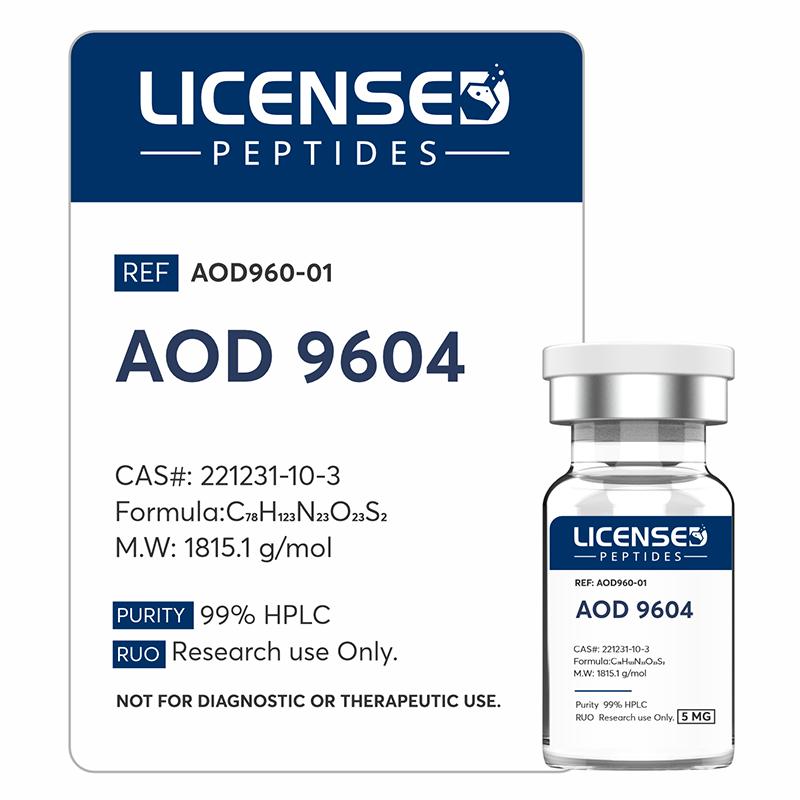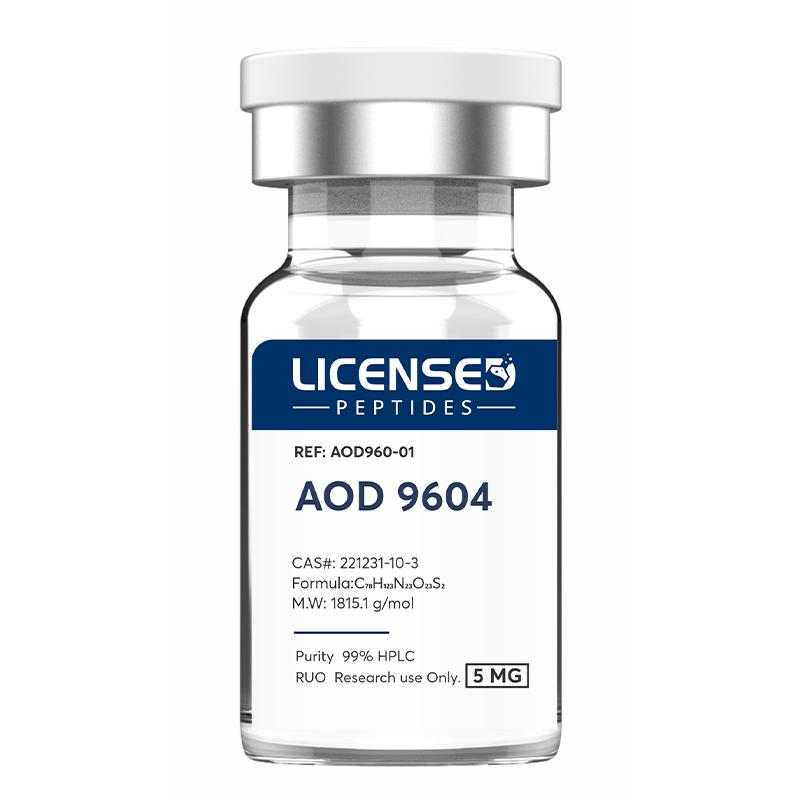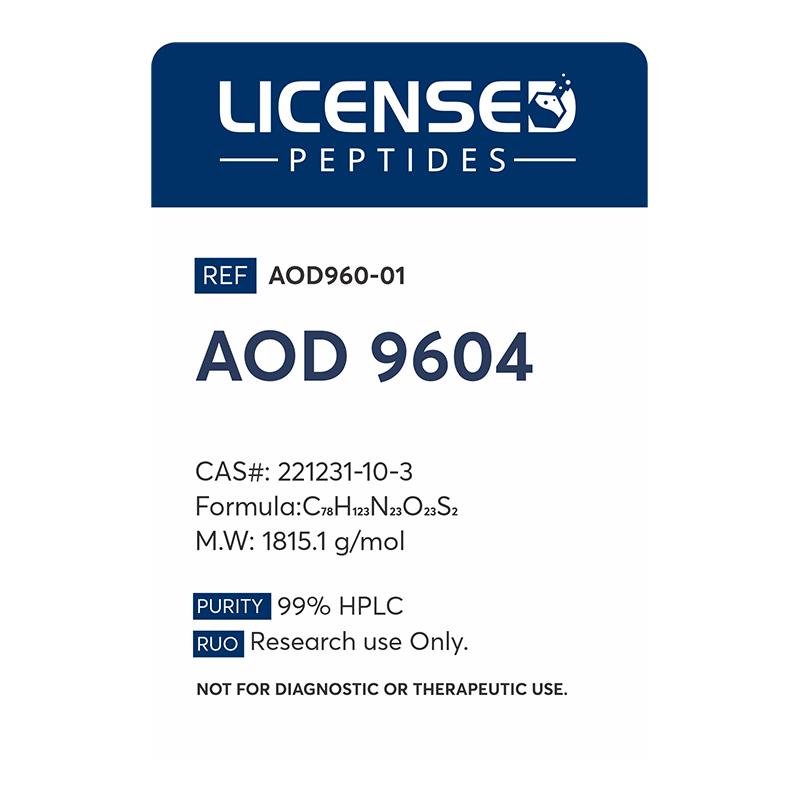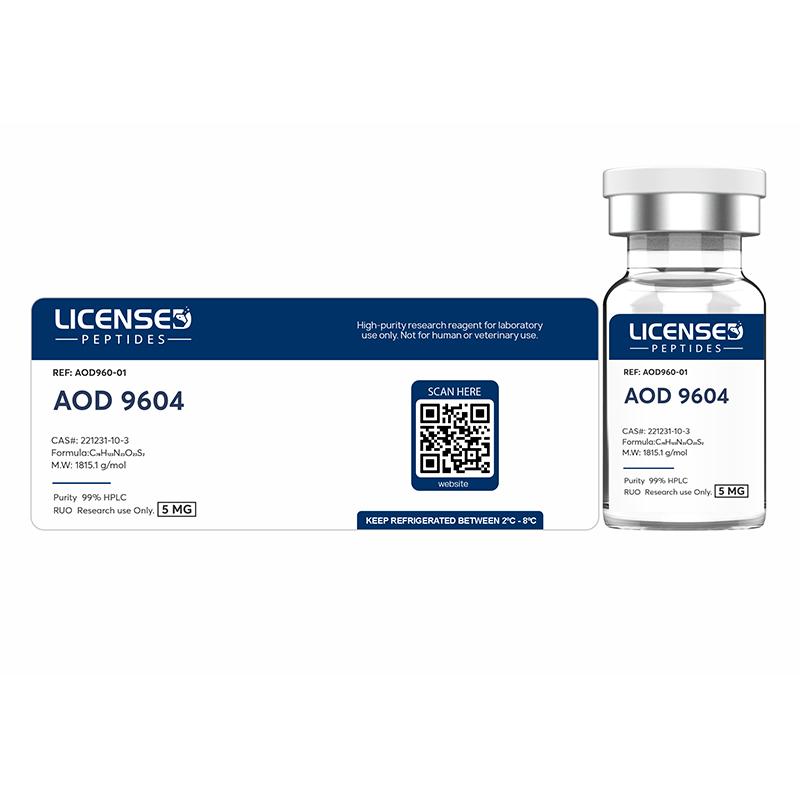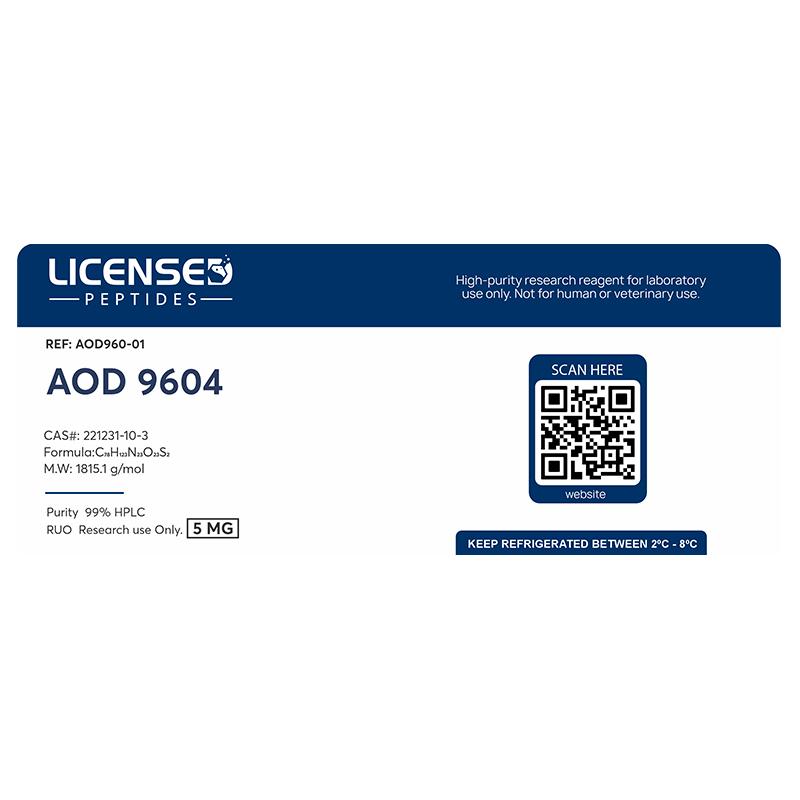AOD9604 5mg
$59.99
AOD9604 is a synthetic peptide fragment derived from human growth hormone (hGH), specifically from the 176-191 amino acid region of the hGH molecule. It was developed to mimic the fat-reducing (lipolytic) effects of hGH without the growth-promoting effects typically associated with the full hormone.
$59.99
$59.99
Peptide Capsules
Purchase Peptides
Purchase Blends
AOD9604 Overview:
AOD9604 is a modified peptide derived from the human growth hormone (hGH) fragment 176-191. It features a di-sulfide bridge that enhances its stability and biological activity. Initially developed for its lipolytic (fat-reducing) properties, AOD9604 has demonstrated potential benefits in metabolic-related conditions, including obesity, cardiovascular disease, osteoarthritis/cartilage regeneration, and metabolic syndrome.
In preclinical studies, AOD9604 has been shown to promote lipolysis—the breakdown of stored fat—and inhibit lipogenesis, the formation of new fat tissue, without the broader systemic effects typically associated with full-length hGH.
AOD9604 : Structure

Source: PubChem
Sequence: YLRIVQCRSVEGSCGF
Length: 16 amino acids
Disulfide Bridge: Cys7–Cys15
Formula: C₇₈H₁₂₃N₂₃O₂₃S₂
Monoisotopic Mass: ~1,813.86 Da (native), ~1,929.92 Da (alkylated)
IUPAC Name: Detailed stereochemical descriptor
SMILES: Linear chemical chain encoding
AOD9604 : Research
AOD9604 : Scientific Journal & Authors
Research Focus: Safety & Metabolism (Non-Clinical)
Title: Safety and Metabolism of AOD9604, a Novel Nutraceutical Ingredient for Improved Metabolic Health (J Endocrinol Metab, Vol 4, No 3, June 2014)
Authors: Margret I. Moré and David Kenley (jofem.org, jofem.org)
Research Focus: Metabolic Activity – Animal Model
Title: Metabolic studies of a synthetic lipolytic domain (AOD9604) of human growth hormone (Horm Res. 2000;53(6):274–278)
Authors: F. M. Ng, J. Sun, L. Sharma, R. Libinaka, W. J. Jiang, R. Gianello (PubMed)
Research Focus: Mechanistic Preclinical Research
Title: Development of a Human Growth Hormone Peptide Analogue AOD9604 into an Anti-Obesity Drug (Book chapter, Peptides: The Wave of the Future, APSY vol 7, 2001)
Authors: Woei-Jia Jiang, Robert Gianello, Mark Heffernan, Esra Ogru, Roksan Libinaki, Frank Ng (SpringerLink)
Research Focus: Preclinical Lipid Metabolism Studies (Mice)
Title: The effects of human GH and its lipolytic fragment (AOD9604) on lipid metabolism following chronic treatment in obese mice and β₃-AR knockout mice (Endocrinology, Dec 2001)
Authors: M. Heffernan, R. J. Summers, A. Thorburn, E. Ogru, R. Gianello, W. J. Jiang, F. M. Ng (Core Peptides, Wikipedia)
Referenced Citations
ALL ARTICLES AND PRODUCT INFORMATION PROVIDED ON THIS WEBSITE ARE FOR INFORMATIONAL AND EDUCATIONAL PURPOSES ONLY.
The products available on this website are intended solely for in-vitro research purposes (Latin: “in glass”), meaning they are used in experiments conducted outside a living organism. These products are not medicines or drugs, have not been evaluated or approved by the U.S. Food and Drug Administration (FDA), and are not intended to diagnose, treat, cure, or prevent any disease or medical condition. Any administration to humans or animals, whether by ingestion, injection, or other means, is strictly prohibited by law.
Test
Storage Instructions:
All of our products are manufactured using the Lyophilization (Freeze Drying) process, which ensures that our products remain 100% stable for shipping for up to 3-4 months.
Once the peptides are reconstituted (mixed with bacteriostatic water), they must be stored in the fridge to maintain stability. After reconstitution, the peptides will remain stable for up to 30 days.
Lyophilization is a unique dehydration process, also known as cryodesiccation, where the peptides are frozen and then subjected to low pressure. This causes the water in the peptide vial to sublimate directly from solid to gas, leaving behind a stable, crystalline white structure known as lyophilized peptide. The puffy white powder can be stored at room temperature until you’re ready to reconstitute it with bacteriostatic water.
Once peptides have been received, it is imperative that they are kept cold and away from light. If the peptides will be used immediately, or in the next several days, weeks or months, short-term refrigeration under 4C (39F) is generally acceptable. Lyophilized peptides are usually stable at room temperatures for several weeks or more, so if they will be utilized within weeks or months such storage is typically adequate.
However, for longer term storage (several months to years) it is more preferable to store peptides in a freezer at -80C (-112F). When storing peptides for months or even years, freezing is optimal in order to preserve the peptide’s stability.
For further information on proper storage techniques, click the link below:
